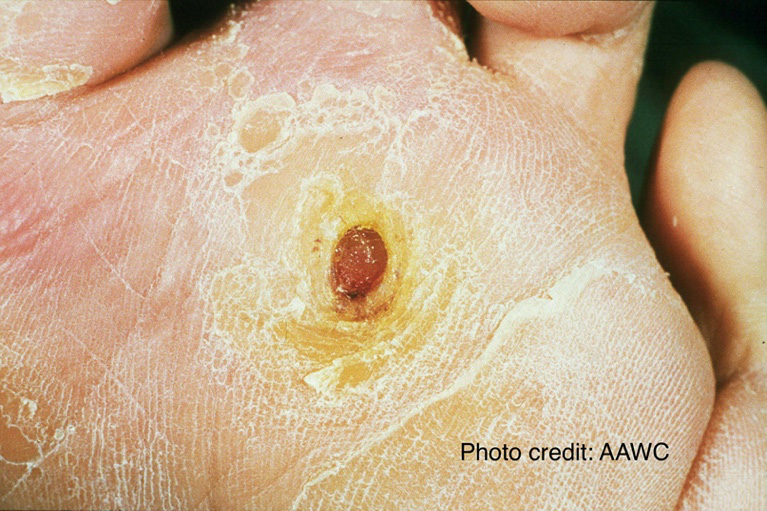What is a Diabetic Ulcer?
Uncontrolled high blood sugar eventually causes damage to the nerves causing neuropathy, where one cannot feel pain from ulcer—leading to a wound or ulceration to progress substantially before it is detected and treated. Photo credit: AAWC
How do you identify it?
Diabetic injuries are mainly found at likely places of repetitive ulcer—plantar aspect of the foot, over metatarsal heads, under heels, toes, bony prominences, and any pressure-bearing areas. The wound margins are even and round with a “punched out quality. The wound base is usually deep and the periwound is often callused and dry. They can often be mistaken for arterial or pressure injuries, so a good medical history as well as a history of the wound itself will help you determine the correct etiology.
How do you treat it?
Routine foot care and regular inspection of the feet goes a long way in the prevention of diabetic injuries. Proper fitting footwear will help to decrease the incidence of repetitive ulcer to the feet. Educate the patient on the importance of following a low carbohydrate, low sugar diet. Strict management of blood sugars with medication and insulin are also important in treatment and prevention. As for the wound itself, an enzymatic debridement agent can be very effective in removing slough in the wound bed in addition to regular surgical debridement as needed. If the ulcer is on the plantar surface, consult with physical therapy to get a better idea of a proper and safe weightbearing status until the wound completely heals.
222 N. Pacific Coast Hwy. Suite 2175 Materials Sourced from:
El Segundo, CA 90245 Marriott, R., Gedalia, U., Dhillon, G., Sandoz, C., & Advantage 1! 877.878.3289 Frazier, T. (2015). Wound Care Essentials. ASWC. SURGICAL & WOUND CARE info@advantagewoundcare.org Wound Educators. (n.d.).
 Upcoming Courses Learn More & Register Here
Upcoming Courses Learn More & Register Here
